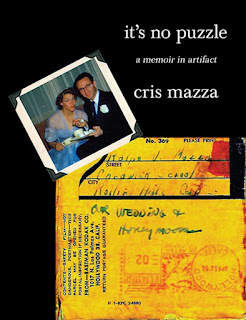Cris Mazza is the author of the new memoir It's No Puzzle: A Memoir in Artifact. Her many other books include the novel Yet To Come. She is a professor in and director of the Program for Writers at the University of Illinois at Chicago.
Q: What inspired you to write It’s No Puzzle, and how did you decide on the idea of “a memoir in artifact,” as the book’s subtitle puts it?
A: The subtitle (as so often is the case) came last, when I had completed the manuscript. But it wasn’t as though I only then realized what I had done. I had been simultaneously scanning my mother’s 30 years of slides before she had moved to print film, and I had finished scanning hundreds of those snapshots as well.
I had also just finished helping my siblings clean out my parents’ house and was preserving and storing paper items – letters, cards, newspaper clippings, my Dad’s military papers, and especially yearbooks from their own high school and college as well as their earliest days of teaching.
So many thoughts and questions passed through my mind while preserving items and scanning the slides – the scan method I was using, they really do pass before your eyes one at a time – and it was too late to ask my parents.
So I just started exploring on my own, through labyrinthian internet searches and genealogy tools like Newspapers.com (I also have done extensive genealogy).
So through the archives and my research, I created a hypothesis for the stories they might have told if I’d ever asked the right questions, plus found parallels to my own life that peeked around the corners.
Q: What impact did it have on you to write this book, and what do you hope readers take away from it?
A: One impact on me that I do hope readers will take away is that all of our parents had (or have) identities beyond just parent. Of course that’s all we can see for the first 20 years of or lives, and sometimes even past that, and it’s what impacts us personally the most.
But they had hopes and disappointments, luck and calamity; emotional, social and cultural issues to contend with; sorrow and confusion and ambitions and adventures that have nothing to do with their roles as parents.
Another startling realization for me (even though on some level I must have known) was that neither my native California in the 20th century nor my own coming-of-age era in the ‘70s were as enlightened as I thought.
A type of “woke,” I guess, to research racial housing covenants in the early 20th century and then interview an African American man I went to school with and hear about racial barriers that were still in place in the ‘70s.
Q: The writer Rick Moody said, “When I think of the condition of the memoir today, longing for a time when it was more committed to the unvarnished human truths, [Cris Mazza] is a writer I think of with great admiration and respect.” What do you think of that assessment, particularly regarding the concept of truth?
A: What this statement makes me think is how too much of memoir has fallen into what some might call navel-gazing or self-pity, offering to readers not much more than a cry for attention or sympathy that has little universality because too often either the author doesn’t consider any complicity or is creating a world of flat villains, victims, and heroes, and no one’s identity extends beyond one trait.
Sure, bad things happen to good people, and sometimes their strength is inspiring. But so also is the strength to admit mistakes inspiring. Universality itself is difficult to achieve, despite the writing axiom focus on the particular, the universal will take care of itself, but I believe that’s the “truth” Moody speaks of.
Q: How did you decide on the images to include in the book?
A: Partially it was the images at hand that decided what narrative would be developed.
Example: The photograph of my mother participating in a blackface event incited four essays – the fourth because one young woman in the photo did not paint her face, and she had a tacitly-admitted lesbian relationship with another faculty member at the private boarding school where my mother taught in the 1940s, so I researched what her experience might have been.
In the essay about my father’s service in 1946 Nuremberg, I was guided to look for photos that could validate some of the few “stories” he told, like when he gave a German man an orange and the man said it lasted a week, a segment a day for his wife and daughter (found a photo of that man), or the soldier who accidentally shot himself with a souvenir German pistol (found a photo of a pistol lying on bedsheets).
Each essay had its own back-and-forth: either an intriguing question-raising photo caused me to dig further in a certain direction, or a discovered/remembered small event caused me to look for an image that might corroborate.
Q: What are you working on now?
A: I have a new completed manuscript that is structurally similar to It’s No Puzzle.
It’s called The Decade of Letting Things Go, and it is more focused on my own experiences with love, longing, divorce, relationships with the world around me, sexual dysfunction, #MeToo, losing parents, seeing an esteemed mentor crumble, coming to terms with childhood scars … all in post-menopause when I’m supposed to be invisible.
Q: Anything else we should know?
A: In wanting our parents to know and appreciate us with an identity that isn’t wholly or only “offspring” or “child,” turning this around and seeking their identities beyond and before “parent” is another way of broadening our own views of ourselves.
--Interview with Deborah Kalb


No comments:
Post a Comment